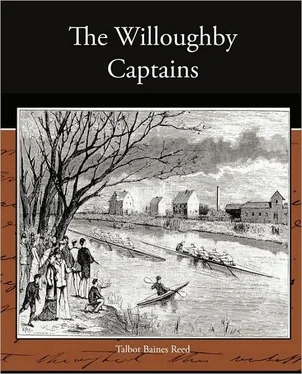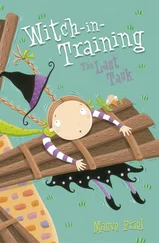Last year, thanks to old Wyndham’s prowess, the school had won; but before that, back almost to the days of the mythical Bouncer, the fates had been the other way; and this year, good as the team was, no one had the hardihood to predict with any confidence a victory for the boys.
Just as Riddell was leaving the tent to take his place in the field, young Wyndham came up and clapped him cheerily on the back.
“Go in and win, I say,” he cried, gaily. “I back you, old man.”
It was the first time the two had met since Riddell’s interview with Tom the boat-boy, and the sight of his old friend’s brother, and the sound of his voice just now, gave the captain a shock which for the moment almost unmanned him.
He turned pale as he looked at the boy, and thought of that knife.
“Oh, I say,” said Wyndham, noticing his perturbation, “pull yourself together, old man; you’ll get on all serene. I was funky the first time I showed up for the second-eleven, you know, but it’s all right now!”
“Now, Riddell!” cried Bloomfield, impatiently, from the wickets; and off the captain hurried to his post, with a load of trouble at his heart, and feeling anything but a jubilant athlete.
Wyndham, little dreaming what was passing through his patron’s mind, settled himself cross-legged at the door of the scorer’s tent, and thought of nothing for the next few hours but the match.
The two Rockshire men, upon whom devolved the duty of “opening the ball,” strolled slowly up to the wickets, and a minute later the match had begun.
As usual, the first few overs were uneventful. The bowlers were trying what the batsmen were made of, and the batsmen were trying what the bowlers were made of. Riddell was thankful for his part that no ball came his way, and the spectators generally seemed to regard two maiden overs as a sort of necessary infliction at the opening of any big match.
But when Bloomfield took the ball again it was evident things were to grow a little brisker. His first ball was very neatly patted towards square-leg for two, amid the cheers which always greet “the first blood,” and his next ball slipped past the long-stop for a bye. Wyndham and some other enthusiasts sighed, as if those three runs had settled the fate of Willoughby. But his sigh was abruptly turned into a cheer when next moment the Rockshire man’s wicket tumbled all of a heap, and one of the foe was out for three.
Willoughby began to breathe again. When they had seen those two portentous heroes go in, the prospect of their ever going out had seemed fearfully remote. But now, if one man was got rid of for only three runs, why should not ten men go for only thirty? At which arithmetical discovery the school immediately leapt from the depths of despondency to the heights of confidence, and considered the match as good as won before it was fairly begun.
However, during the next half-hour they had time to seek the happy mean between the two extremes. The newcomer was a tough customer, and should certainly have gone in first. For he was one of those aggravating batsmen who keep a steady bat at everything, who never aspire to a slog, never walk out to a slow, never step back to a yorker, are never too soon for a lob, or too late for a shooter — in fact, who play the safe plodding game in the face of all temptation.
The one comfort was, he did not make many runs. Still, this sort of business is demoralising for bowlers and slow for the field, and a change of bowlers was consequently decided upon after about half an hour’s play, when the score was at twenty-one.
Game and Porter were the two new hands, the latter being the first to officiate with a very neat maiden over, loudly cheered from the school tent. Game who followed, was not so fortunate. The Rockshire man who had gone in first cut him hard for three on his second ball — the first hard hit of the match. And this the steady man followed up with a quiet two neatly placed between point and mid-off. Then came another ball, which the same player turned off sharply into the slips.
It was a fairly difficult ball to field, but Riddell picked it up smartly and returned it to the wickets in time to prevent a run being made.
“Well fielded indeed, sir!” cried Wyndham’s voice from the tent. Little thought he how strangely those words of encouragement missed their mark. Riddell had just been forgetting his trouble and warming up to the game, and now they came once more to remind him of that hated knife and Tom the boat-boy’s story.
The next ball the Rockshire man also “slipped,” but this time, though it was within easier reach, and for a first-rate fielder was even a possible catch, Riddell missed it, and two runs were made. “Look out there!” cried Bloomfield severely. “Well tried, sir!” cried some one, sarcastically. “Well missed, sir!” cried some one else, with painful truthfulness. Riddell saw the crisis. Another miss like that, a few more taunts like those, and he might as well retire from the field.
Not for the first time in his life he pulled himself together with a vehement effort and shook off every thought but the one duty that claimed him.
And only just in time.
The last ball of the over was played again into slip, this time very smartly. The school shivered as they saw it whiz straight for the weak point. But they might have spared themselves their agitation, for Riddell had it — all but a catch — before the shiver was over, and had returned it to Fairbairn at the wickets promptly enough to make the Rockshire man feel he had had a narrow escape of a run-out.
“Fielded, sir!” said Bloomfield, as the players crossed over; and this commendation was more encouraging than all the shouts of the schoolhouse partisans.
Porter’s next over disposed of the first Rockshire man, amid great school rejoicing, which was only tempered by the reflection among the Parretts that it was a wicket to the credit of the schoolhouse half of the eleven.
Then followed a succession of short but smart innings, during which the Rockshire score crawled up to seventy, despite of a further change of bowlers and very careful all-round fielding by the school.
All this time the steady man hung on obstinately; nothing seemed to puzzle him or tempt him out of his caution.
At length, in sheer desperation, Coates was put on to bowl; anything seemed better than this hopeless deadlock. And so it turned out. Coates’s first ball came down temptingly towards the off stump. Any enterprising player would have cut it for a safe four, but this cautious hand, who seemed to smell a rat in everything, was evidently determined not to be taken in by first appearances, and turned it off, half contemptuously, to his favourite quarter among the slips, thinking possibly he might punish the next rather more freely. But the next was not to come for him. Coates’s ball was rising a bit as the batsman touched it, and though he did not hit it up, it yet spun a foot or so above the ground, an easy catch, straight into Riddell’s hand, who held it fast, much to his own surprise, and greatly to the jubilation of all Willoughby.
“Well caught, sir! Caught, indeed! Played up, Riddell!” were the cries which on all hands greeted the achievement, Wyndham’s call being longest and loudest of them all.
But this time Riddell suffered no harm from the sound of that familiar voice. He had steeled himself against it for a few hours at least, and it was to him but one out of many.
Rockshire’s first innings terminated shortly with no further event of note. The last wicket fell for ninety-two, a respectable total, of which fifty-nine had been made off the Parretts’ batsmen, and thirty-three off the schoolhouse. Indeed, the advantage of the schoolhouse did not end there. Out of three catches — not counting Riddell’s — they had made two, while of the five wickets which had been taken by the bowling, they claimed three against their rivals’ two.
Читать дальше












